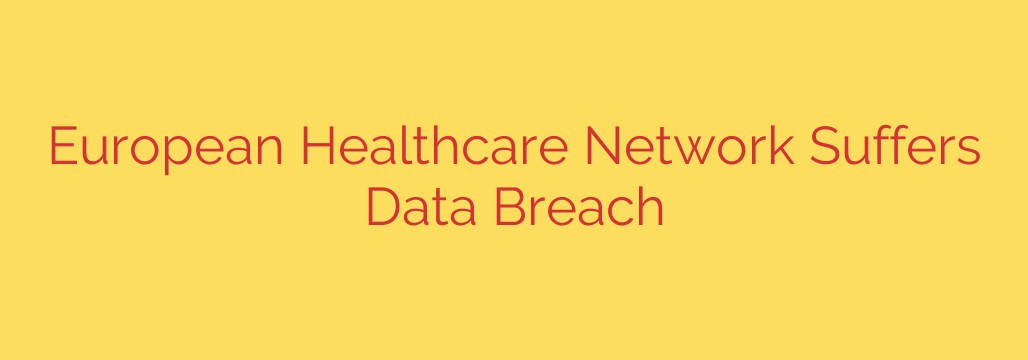
Major European Healthcare Data Breach Exposes Sensitive Patient Records
A significant cyberattack has compromised the sensitive personal and medical data of thousands of patients across Europe, highlighting the increasing vulnerability of the healthcare sector to sophisticated digital threats. The breach, which targeted a major network providing administrative services to hospitals and clinics, has raised serious concerns about patient privacy and data security.
The incident underscores a troubling trend: cybercriminals are increasingly targeting healthcare organizations due to the high value of the data they hold. Medical records are a goldmine on the dark web, often containing enough information for comprehensive identity theft, financial fraud, and other malicious activities.
What Happened in the Attack?
According to preliminary reports, cybercriminals exploited a vulnerability in the network’s third-party software to gain unauthorized access. Once inside the system, they were able to navigate through the network and exfiltrate vast amounts of data over an extended period before the intrusion was detected.
This type of supply chain attack is particularly dangerous because it targets the weaker links in an organization’s digital ecosystem. Even if a hospital has robust security, a vulnerability in one of its trusted vendors can create a catastrophic backdoor for hackers.
What Patient Information Was Compromised?
The scope of the stolen data is extensive and highly sensitive. While investigations are ongoing, the compromised information is understood to include:
- Full names, addresses, and dates of birth
- National identification and insurance numbers
- Contact information such as phone numbers and email addresses
- Detailed medical histories, including diagnoses and treatments
- Lab results and physician’s notes
- Billing and financial information
The exposure of such comprehensive data sets poses a severe risk to affected individuals. Unlike a stolen credit card, which can be easily canceled, personal health information is permanent and can be used for blackmail, targeted phishing scams, and complex identity fraud.
Why Healthcare is a Prime Target for Hackers
The healthcare industry is an attractive target for several key reasons. Firstly, medical data is extremely valuable, fetching a higher price on illicit markets than credit card details. Secondly, healthcare organizations often operate with a complex mix of new and legacy IT systems, which can create security gaps. Finally, the critical nature of healthcare services makes these institutions more likely to pay a ransom to restore operations quickly, making them a prime target for ransomware attacks.
The pressure for digital transformation, accelerated by the recent global health crisis, has expanded the attack surface for many providers, often without a proportional increase in cybersecurity budgets and resources.
Actionable Steps to Protect Your Information
While you may not have been affected by this specific breach, it serves as a critical reminder to be proactive about your digital security. Here are essential steps everyone should take to protect their personal data:
Be Vigilant About Phishing: Be extremely cautious of unsolicited emails, texts, or phone calls claiming to be from your healthcare provider, insurance company, or a government agency. Never click on suspicious links or provide personal information without first verifying the sender through an official channel.
Use Strong, Unique Passwords: Avoid using the same password across multiple accounts. Use a password manager to create and store complex, unique passwords for each of your online services, especially for patient portals and insurance websites.
Enable Two-Factor Authentication (2FA): Wherever possible, enable 2FA on your accounts. This adds a critical layer of security by requiring a second form of verification (like a code sent to your phone) in addition to your password.
Monitor Your Accounts: Regularly review your medical bills, insurance explanations of benefits (EOBs), and credit reports for any suspicious activity. Look for services you didn’t receive or accounts you don’t recognize.
Question Information Requests: Be skeptical of any request for sensitive information. A legitimate healthcare provider will rarely ask for your full personal details or password via email. If in doubt, call them directly using a phone number from their official website.
This breach is a stark warning for both patients and healthcare providers. As our medical lives become increasingly digitized, robust cybersecurity measures are no longer optional—they are essential to protecting patient safety and privacy.
Source: https://www.bleepingcomputer.com/news/security/major-european-healthcare-network-discloses-security-breach/








